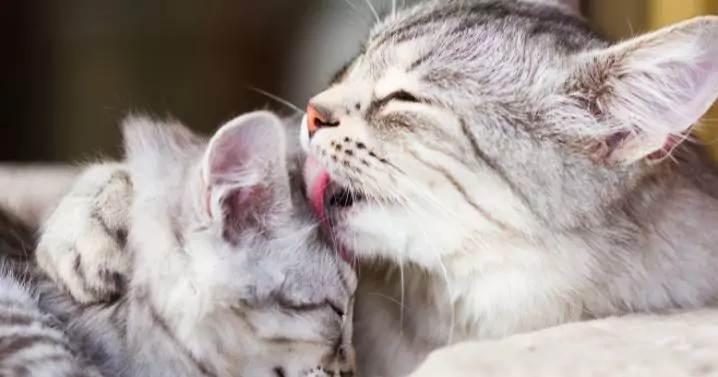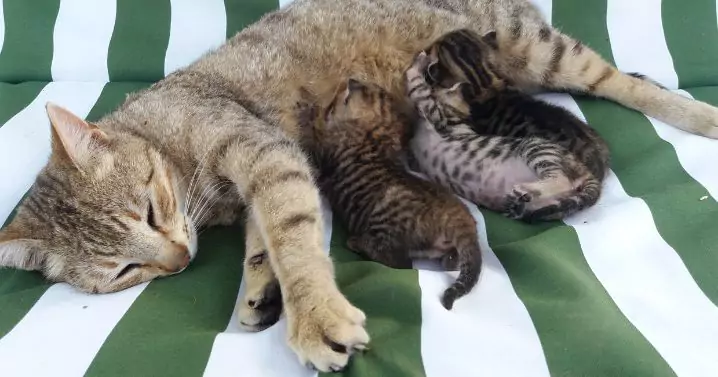
The arrival of a litter of kittens in a home always embodies a great event. It is indeed very touching to see these little beings take their first steps in life alongside their mother, who takes care of them on a daily basis. A question then arises: will the cat spend the rest of its life alongside its young, even if they grow up? The answer is in this file.
The importance of the relationship between kittens and their mother
Many mammals need their mother’s care and presence during their first weeks of life, and cats are no exception. As soon as the birth is over, the cat begins by meticulously cleaning her young in the nest. She then places herself in the nursing position, all the while nudging them and nudging them to help them find the nipples. The first mammary secretion absorbed is none other than colostrum, essential for the development of its antibodies and for the proper functioning of its immune system. It is at this stage that the newborn learns the kneading movement, which he uses to squeeze the nipple and get more milk. This neonatal period marks a strong moment for the mother, who plays an essential role in providing warmth, food, and protection to her young.
Also…
After meals, she also proceeds to clean the kitten, which she will continue until the latter assimilate the complex process of grooming. The cat follows very closely the process of impregnation and familiarization of its young with their siblings, human beings or their environment. These stimuli are necessary to forge the capacities of adaptation, but also of life in the society of the kitten.
This one gradually learns the feline codes, especially those of life in a group, but which will also serve him in his future relationships with humans. Games and fights then make it possible to establish a hierarchy within the litter, under the watchful eye of the mother who does not hesitate to sanction a little one who is too turbulent. They are also an essential step in learning to control scratches and bites. Finally, a kitten away from its mother is a kitten in distress. He can quickly die without it, or if he does not receive care from a human. Moreover, a cat who feels danger for her young can move the litter at any time, in order to put them in a safe place.
A natural weaning process
During the first four weeks, the mother spends almost all her time in the nest. The fifth week, however, marks the beginning of increasingly frequent absences, as well as the beginning of food weaning. The cat thus moves away from the little ones when they cry out, growls, or hisses if they get too close, and avoid getting into a suckling position; she will then completely refuse breastfeeding during the third month. Kittens, who are beginning to see their first teeth appear, have normally begun to get used to solid food, whether small prey, food, or kibble (dry or wet). This change may be surprising but is entirely a withdrawal phenomenon.
At the same time, social and emotional weaning is therefore carried out by the marked absences of the mother, which allow the little ones to blossom little by little in the absence of authority, but by being marked by her teachings. It is carried out gradually so that the kitten can memorize and structure its achievements. It is generally considered that it ends around the age of four months. If attachment at birth is essential for survival, detachment is just as important: this is why it is essential not to adopt a kitten before it is at least three months old. He will thus have had time to benefit from all the essential learning from his mother. Early separation often leads to behavioral issues, such as lack of bite inhibition or hyperactivity, which can cause owners to make dramatic decisions.
Why do some cats abandon their young?
Nature is well done, and in the vast majority of cases, cats take care of their litter perfectly. Dropouts do exist, however, and can occur from birth, for various reasons:
- One or more kittens are malformed, too weak, or sick: the mother relies here on the animal’s survival instinct and feels that they will not survive. She, therefore, devotes herself to the little ones who have a better chance of growing up, and can even keep them away so that the strongest do not fall ill in turn.
- The cat is sick herself: she does not have the physical strength to take care of her babies, and she chooses to try to preserve herself. Some females also develop mastitis, which turns nursing into a source of severe pain.
- The cat lacks maternal instinct: this scenario can arise if the cat is too young, or has undergone significant stress during mating, gestation, or birth.
- The litter is too large (more than eight kittens): the mother does not have enough milk to feed them all, which explains the fact that she will once again focus on the most vigorous, rejecting the weakest of instinctive way
- The cat is neglected: a malnourished animal or one that does not have an appropriate space to raise its young could reject them
- The cat has had a caesarean section: this operation can prevent the production of maternity hormones, which induces a feeling of not belonging
Besides that…
If the abandonment occurs in the weeks following the birth, and especially during the first month, make sure that the cat is in good health. She could indeed have difficulty feeding the young, due to illness, weakness, or strong anxiety. You should also know that a human intrusion into a litter of wild cats can have terrible consequences: the mother often abandons her young, whose body has been marked by a foreign smell. This behavior is very rare in domestic cats, the female being normally accustomed to the scents of her owners. The nest must however remain a refuge for the new mother and her babies, in a calm, warm place and away from the passage.
Keeping one of the little ones at home with the cat: is this the solution?

However, this starts with a good intention: you may not have found a future adopter for the last baby in the litter, or you think that your adult cat will be delighted to spend more time with its offspring. However, this is a received idea that can have serious consequences: the cat absolutely does not want to stay with her young once they have been weaned. The fact of provoking this situation by keeping a kitten within the home and cohabiting with its mother goes against the very nature of this animal.
If the little ones will always remember the smell of their mother, she completely forgets them and moves on to something else, even to a new litter. Many studies have looked into the subject, and believe that it would be a biological response intended to prevent inbreeding for future generations, thus preventing cats from the same family from interbreeding. In practice, when the young are tempted to reassure himself between his mother’s paws, the latter does not understand this behavior and will push him away, hence the appearance of tension between the two, then stress or depression in the kitten which will remain behind without finding its place.
Hence..
Even if one might think the opposite, this also happens between two females: it is not uncommon to see a girl who is no longer in heat because she is too afraid of her mother. If you decide to try the experiment anyway, expect unusual, even aggressive interactions between your two cats, who will probably argue. Rivalries will also be exacerbated during periods of heat or reproduction. One of the two could also decide to run away. As you will have understood, the cohabitation between a mother and her child is therefore not necessary, in that it could quickly degenerate. However, it should be noted that there are exceptions to this phenomenon ., and that some cats can very well live for years with one of their young. Do not hesitate to take stock with your veterinarian if you wish to keep one of your cats
young, as well as to ask him all your questions on this subject: he remains your privileged interlocutor in terms of feline behavior. You can also call on a specialized behaviorist.
I was excited to uncover this website. I need to to thank you for ones time for this particularly fantastic read!! I definitely really liked every part of it and i also have you bookmarked to look at new things in your site.